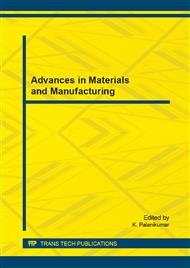[1]
J.N.D. Gupta, Two-stage, hybrid flow shop scheduling problem, Journal of the Operational Research Society, 39 (4) (1998) 359–364.
Google Scholar
[2]
J.A. Hoogeveen, J.K. Lenstra, B. Veltman, Preemptive scheduling in a two-stage multiprocessor flow shop is np-hard, European Journal of Operational Research, 89 (1) (1996) 172–175.
DOI: 10.1016/s0377-2217(96)90070-3
Google Scholar
[3]
P. Schuurman, G.J. Woeginger, A polynomial time approximation scheme for the two-stage multiprocessor flow shop problem, Theoretical Computer Science, 237 (1–2) (2000) 105–122.
DOI: 10.1016/s0304-3975(98)00157-1
Google Scholar
[4]
C. Koulamas, G.J. Kyparisis, Asymptotically optimal linear time algorithms for two-stage and three-stage flexible flow shops, Naval Research Logistics, 47 (3) (2000) 259–268.
DOI: 10.1002/(sici)1520-6750(200004)47:3<259::aid-nav5>3.0.co;2-k
Google Scholar
[5]
T.P. Hong, T.T. Wang, S.L. Wang, A palmer-based continuous fuzzy flexible flow-shop scheduling algorithm, International Journal of Soft Computing, 5 (6) (2001) 426–433.
DOI: 10.1007/s005000100109
Google Scholar
[6]
D. He, A. Babayan, Scheduling manufacturing systems for delayed product differentiation in agile manufacturing, International Journal of Production Research, 40 (11) (2002) 2461–2481.
DOI: 10.1080/00207540210136522
Google Scholar
[7]
C. Oguz, M.F. Ercan, T.C.E. Cheng, and Y.F. Fung, Heuristic algorithms for multiprocessor task scheduling in a two-stage hybrid flow-shop, European Journal of Operational Research, 149 (2) (2003) 390–403.
DOI: 10.1016/s0377-2217(02)00766-x
Google Scholar
[8]
J.X. Xie, X. J Wang, Complexity and algorithms for two-stage flexible flowshop scheduling with availability constraints, Computers and Mathematics with Applications, 50 (10–12) (2005) 1629–1638.
DOI: 10.1016/j.camwa.2005.07.008
Google Scholar
[9]
J.X. Xie, W.X. Xing, Z.X. Liu, J.F. Dong, Minimum deviation algorithm for two-stage no-wait flow shops with parallel machines, Computers and Mathematics with Applications, 47 (12) (2004) 1857–1863.
DOI: 10.1016/j.camwa.2003.08.003
Google Scholar
[10]
C.S. Sung, H.A. Kim, A two-stage multiple-machine assembly scheduling problem for minimizing sum of completion times, International Journal of Production Economics, 113 (2) (2008) 1038–1048.
DOI: 10.1016/j.ijpe.2007.12.007
Google Scholar
[11]
S. Sridhar, T. Prabaharan, M. Saravanan, Optimisation of sequencing and scheduling in hybrid flow shop environment using heuristic approach, International Journal of Logistics Economics and Globalisation, 2 (4) (2010) 331–351.
DOI: 10.1504/ijleg.2010.037520
Google Scholar
[12]
M. Saravanan, S. Sridhar, An overview of hybrid flow shop scheduling: sustainability perspective, International Journal of Green Computing, 3 (2) (2012) 78–91.
DOI: 10.4018/jgc.2012070106
Google Scholar
[13]
C.T. Tsenga, C.J. Liao, T.X. Liao, A note on two-stage hybrid flow shop scheduling with missing operations, Computers and Industrial Engineering, 54 (3) (2008) 695–704.
DOI: 10.1016/j.cie.2007.09.005
Google Scholar
[14]
F. Jolai, H. Asefi, M. Rabiee, P. Ramezani, Bi-objective simulated annealing approaches for no-wait two-stage flexible flow shop scheduling problem, Scientia Iranica, 20 (3) (2013) 861–872.
DOI: 10.2139/ssrn.3431088
Google Scholar
[15]
E. Figielska, Heuristic algorithms for preemptive scheduling in a two-stage hybrid flow shop with additional renewable resources at each stage, Computers & Industrial Engineering, 59 (4) (2010) 509-519.
DOI: 10.1016/j.cie.2010.06.006
Google Scholar
[16]
H.S. Mirsanei, M. Zandieh, M.J. Moayed M.R. Khabbazi, A simulated annealing algorithm approach to hybrid flow shop scheduling with sequence-dependent setup times, Journal of Intelligent Manufacturing, 22 (2011) 965–978.
DOI: 10.1007/s10845-009-0373-8
Google Scholar
[17]
D. He, A. Babayan, Scheduling manufacturing systems for delayed product differentiation in agile manufacturing, International Journal of Production Research, 40 (11) (2002) 2461–2481.
DOI: 10.1080/00207540210136522
Google Scholar
[18]
M. Saravanan, S. Sridhar, N. Harikannan, Optimization of realistic multi-stage hybrid flow shop scheduling problems with missing operations using meta-heuristics, International Journal of Engineering and Technology, 6 (1) (2014), 484-496.
DOI: 10.15866/ireme.v8i5.3296
Google Scholar
[19]
J. H Holland, Adaptation in natural and artificial systems, The University of Michigan Press, Ann Arbor, (1975).
Google Scholar
[20]
S. Kirkpatrick, C.D. Gelatt, M.P. Vecchi, Optimization by simulated annealing, Science, 220, (4598) (1983), 671-680.
DOI: 10.1126/science.220.4598.671
Google Scholar


